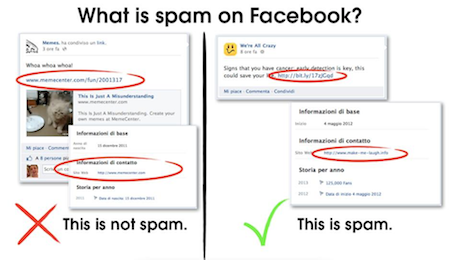 If spammers use bit.ly, it is possible to track how many clickthroughs there have been for a link
If spammers use bit.ly, it is possible to track how many clickthroughs there have been for a link
 Spammers posting links on Facebook fan pages to send people to
third-party scam sites are earning $200m every year, according to
calculations by a team of Italian security researchers who have
investigated hundreds of thousands of posts on the social network.
Spammers posting links on Facebook fan pages to send people to
third-party scam sites are earning $200m every year, according to
calculations by a team of Italian security researchers who have
investigated hundreds of thousands of posts on the social network.Andrea Stroppa and Carlo De Micheli, the leaders of the group, analysed pages across the network, and identified spam through the use of phrases such as "Hey click here for a free iPhone" followed by links to sites outside the network.
They also discovered sites where spammers offer to set up fake fan pages in order to tempt Facebook users to click on links.
A page with spam links on Facebook
The postings breach Facebook's terms of service, which says that "third-party advertisements on [fan] Pages are prohibited without our prior permission."
But trying to catch and get rid of the spammers is a growing problem for Facebook. The revenue that the spammers - and those running the sites linked to - do not form part of Facebook's revenue, but instead piggyback on the success of the social network, which now has more than a billion users worldwide.
The URLs to the outside sites have their destination hidden by using legitimate link-shortening services such as Tinyurl.com or bit.ly. That also makes it possible for researchers to track the ultimate destination - and figure out how many people click on the link.
About 9% of the pages that users were directed to by spammers instead use Google's AdSense - meaning that Google inadvertently gets a cut from the money being made by the buyers of spam services.
Pay per post
"The spam posters get paid an average of $13 per post, for pages that have around 30,000 fans, up to an average of $58 to post on pages with more than 100,000 fans," De Micheli told the Guardian. "If we consider these two as extremes, the pages we analysed generate a revenue of 18,000 posts per day, times the revenue per post - ranging from $13 to $58 - 365 days a year."That gives a range for the spammers' earnings of between $87m and $390m - but when they took into account the number of fans of the pages, the weighted average was just over $200m annually.
Often the spammers begin by setting up their own "fan pages" and attract human users to them - and then once they have enough Likes on the page they can begin selling links on it to third parties.
Stroppa and De Micheli found 20 key sites where spammers congregated offering "black marketing" in which they would contract to post spam links in return for cash.
But the spammers argue that they are helping Facebook. One told the researchers over Skype: "Facebook doesn't ban us, simply because we generate the content on Facebook itself. Everyday I materialize funny, and interesting content full of phrases and so forth that is shared and liked by thousands of users. Without the fan pages Facebook would be an empty place. Tell me how many links do you see shared by your friends on your timeline everyday? You see - the answer is simple."
But Stroppa and De Micheli counter that the spammer's motive is pure financial self-interest: "For people involved in this business the sole reason to continue is for the profit. We even found somebody who was selling a page dedicated to the memory of the victims of the Boston terrorist attack for $1,000."
In April, the Italian team uncovered the multimillion-pound business of selling fake Twitter followers, estimating then that as many as 20m were created by spammers and so fake. There, they calculated that Twitter followers were sold in packages - ranging from $1 for 1,000 extra followers, up to $1,000 for a million. They reckoned that made it a business worth between $40m and $360m.
Long term business
In looking into Facebook spam, the researchers found posts offering to sell spam links on Facebook fan pages dating back to 2010. But on the present-day forums, they found spammers' prices for posting to pages which already had more than 30,000 "Likes" - and so would be likely to show up in peoples' News feeds, or be regularly visited - varied from $8 to $20. For pages with over 100,000 Likes, the prices ranged from $35 to $100.They also uncovered a network of 30,000 pages involved in posting spam to Facebook.
 What is spam on Facebook? Italian researchers offer their guidance
What is spam on Facebook? Italian researchers offer their guidance
"Third parties pay spammers to post their links on Facebook pages, to reach the largest amount of users possible," said De Micheli. For the financial model to work, the third parties must be accruing benefits even greater than they are paying the spammers - though it is impossible to know what their rate of return might be.
"We notice that it is rather common for the landing page [from a link] to be a product on an e-commerce site made to monetise quickly rather than to generate traffic on a home page," De Micheli said. "Links to YouTube can be used to generate views, and so money - view generation on YouTube is a fast-growing market." YouTube offers revenue-sharing arrangements with a number of users.
Another outside site identified by the researchers promises that some people who post affiliate links - which pay an intermediary small amounts for clickthroughs to the main site - are getting paid "thousands of dollars per day".
According to their analysis, around one in eight of the pages they looked at was actually harbouring spam links.
Facebook action
Facebook takes action against spam pages and posts where they are reported by users, but the sheer volume of spam postings could overwhelm its checkers' ability to crack down on spam.A Facebook spokesperson said: "Protecting the people who use Facebook is a top priority for us, and we have developed a number of automated systems to identify potentially harmful links and stop them from spreading. Those systems quickly spotted these links, and we are working to clear them from the site now.
"In the meantime, we have been blocking people from clicking through the links and have reported the bad browser extensions to the appropriate parties. We believe only a small percentage of our users were affected by this issue, and we are currently working with them to ensure that they've removed the bad browser extension. We will keep improving our systems to ensure that people continue to have a safe experience on Facebook."




No comments: